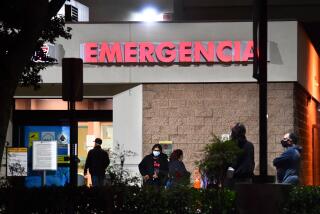Doctors Urged to Screen for Teen Sexual Assaults
- Share via
Although the subject is likely to cause some discomfort for both doctor and patient, the nation’s leading pediatricians’ group is recommending that doctors use the annual physical exam to ask teenagers if they’ve been raped or sexually assaulted.
Behind that recommendation is the reality that teenagers have the highest rates of rape and sexual assault of any group. Three of every four teen victims are assaulted by an acquaintance or relative.
Despite the rates, teens typically are reluctant to come forward. Studies show, for example, that teenage girls are less likely than adult women to seek immediate medical care after rape or sexual assault. When they’re raped by someone they know, they may think that no one will believe them, or they may be confused about whether they were somehow responsible for the attack.
That makes it all the more appropriate for a person in a position of authority and potential trust, such as a pediatrician, to intervene.
This requires not just that doctors ask, but that they also know what to do if the patient says yes, a situation that many doctors fear, says Dr. David Kaplan, a pediatrics professor and chief of adolescent medicine at the University of Colorado in Denver. Doctors must be prepared to provide appropriate treatment, counseling and referrals, according to new recommendations from the American Academy of Pediatrics.
The academy revised its 1994 policy on caring for adolescent sexual-assault victims to reflect new figures that show 40% of teen victims and teen assailants used alcohol or drugs. An increase in adolescent acquaintance rape has been linked to availability of Rohypnol and GHB, medications that act as sedatives and create amnesia. They can leave victims without a clear memory of the sexual assault and may discourage them from coming forward.
Last week, two women testified in a Ventura County courtroom that Andrew Luster, the great-grandson of cosmetics legend Max Factor, tricked them into taking GHB, gamma hydroxybutyrate, before raping them. At the hearing, called by prosecutors who must decide whether Luster should stand trial, defense attorneys said the women consented to taking the drug and having sex with Luster.
The guidelines, which appear in the June issue of the academy’s journal Pediatrics, recommend that doctors who treat teens:
* Screen for both past sexual history and sexual victimization during teens’ annual checkups or other office visits and give them the chance to describe incidents in their own words.
* Become familiar with local sexual-assault reporting requirements as well as community services for rape victims.
* Be prepared to offer support and psychological counseling.
* Be ready to provide preventive counseling (for example, advising teens to avoid late-night drinking and drug use that could lead to sexual assault).
Encouraging youngsters to disclose sexual attacks to their doctors has ramifications for the child, the family, the law-enforcement community and the doctor, said Gail Abarbanel, founder of the Rape Treatment Center at Santa Monica-UCLA Medical Center.
“The most important thing is if you’re going to ask, you have to be prepared to respond if you get a disclosure,” said Abarbanel.
Under the child-abuse reporting law, doctors must report any sexual attack of someone under age 18.
Sharing the information with authorities can potentially create new stresses for the young victim. Many doctors are reluctant to make a report, fearing it will jeopardize the relationship they’ve built over years with the young patient and the family.
Nevertheless, says Abarbanel, doctors need to be mindful of the long-term physical and mental health consequences of silence. Research has shown that failure to deal with the trauma of sexual assault can lead to physical and emotional difficulties later.
Encouraging victims to speak up gives them a chance to share what may be too painful to handle alone; it also provides an opportunity for the doctor to help stop any ongoing abuse, Abarbanel said. “We see a lot of kids who tried to tell an adult and didn’t get help the first time.”
Providing treatment and counseling for a sexual-assault victim can be time-consuming for pediatricians, who are also expected to screen for substance abuse, teen pregnancy, sexually transmitted diseases and mental-health disorders.
Doctors who perform forensic exams themselves must protect and properly handle all evidence, make sure the victim is informed about pregnancy and possible exposure to sexually transmitted diseases, and given psychological counseling.
Pediatricians can learn to ask their patients the right questions, says Kaplan, who chairs the academy’s committee on adolescence. The doctors, he says, might ask a direct question: “Have you ever been physically or sexually abused?” Or they might try a more oblique query: “Has anybody ever done anything to hurt you emotionally?” or “Is there something you’re kind of embarrassed to talk about but would maybe like to write down for me?”
With both women and men, “you often get some body language that tells you there’s something going on here,” Kaplan said. In other cases, depression or an eating disorder may be the hint that the adolescent has had an experience with sexual assault, he said, and it’s important to give them the opportunity to discuss it.
Although sexual abuse is a touchy subject, Kaplan said he’s never had parents object to his questions, even when he’s posed them to their 12-year-old daughters or sons.
“Parents are so thankful that you’re covering those kinds of issues with their kids because they know it’s out there and they worry about it,” he said. “The rewards can be tremendous if you really find something that has been bothering the adolescent.”
More to Read
Sign up for Essential California
The most important California stories and recommendations in your inbox every morning.
You may occasionally receive promotional content from the Los Angeles Times.










